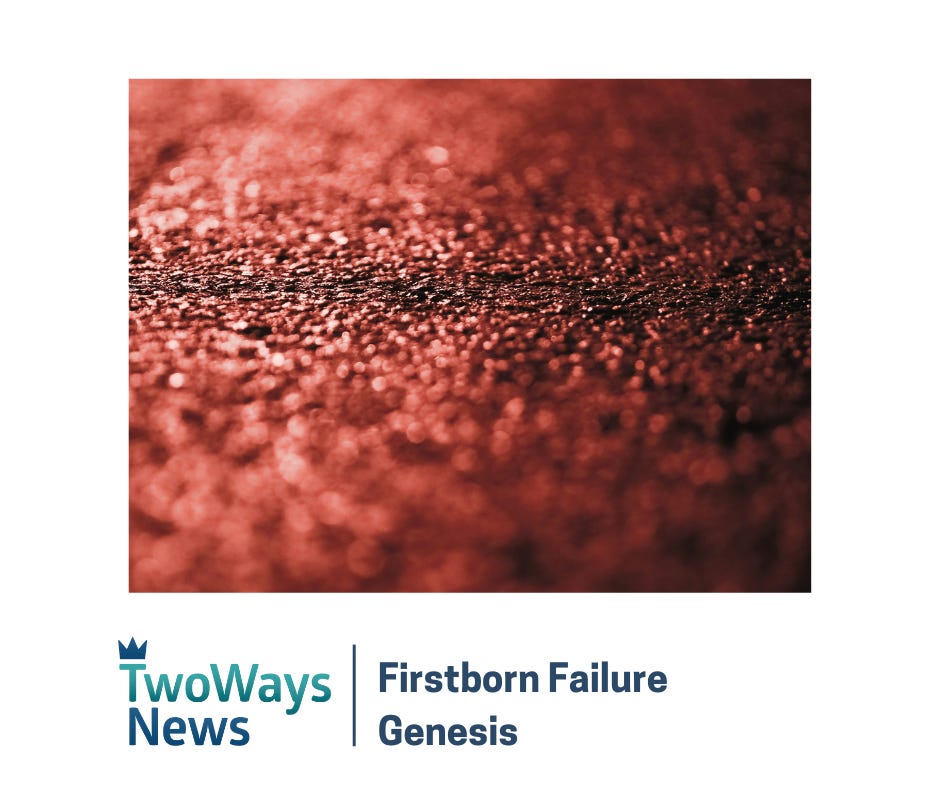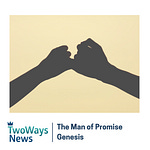Dear friends,
We return this week to Genesis and chapter 4. It’s a passage that Peter and I should be able to empathetically deal with: Cain and Abel, brothers at war!
Thank you to those who have sent messages of encouragement to us and questions to push our thinking. Please continue to encourage others to subscribe to Two Ways News.
Yours,
Phillip
Phillip Jensen: Thank you for your feedback. Joshua has sent us a very helpful point about sin, which we spoke about some weeks ago. He pointed out: not only is ‘I’ the centre letter of the word ‘sin’, but ‘I’ is also the centre letter of the word ‘pride’. The main point he makes, though, is about foolishness, which is listed as an example of what comes from within that defiles us in Mark 7:23. I tend to understand the word ‘foolishness’ as being the opposite of knowledge, but within the Bible, foolishness is part of sinfulness, not just intellectual inability. Psalm 14 reads, “The fool says in his heart, ‘There is no God.’” A fool in Proverbs 3:7 is someone who is ‘wise in his own eyes’. So, the fool does not just have an intellectual or knowledgeable failure, but also a moral and spiritual failure.
Peter Jensen: Phillip, our mother introduced us to some biblical references.
Phillip: When I asked anything about you or our brother, she would say, ‘Am I my brother’s keeper?’, which is from Genesis.
Peter: From this great story of Cain and Abel.
Phillip: How about you remind us of the Cain and Abel story, in Genesis 4:1-14?
Peter:
Now Adam knew Eve his wife, and she conceived and bore Cain, saying, “I have gotten a man with the help of the LORD.” And again, she bore his brother Abel. Now Abel was a keeper of sheep, and Cain a worker of the ground. In the course of time Cain brought to the LORD an offering of the fruit of the ground, and Abel also brought of the firstborn of his flock and of their fat portions. And the LORD had regard for Abel and his offering, but for Cain and his offering he had no regard. So Cain was very angry, and his face fell. The LORD said to Cain, “Why are you angry, and why has your face fallen? If you do well, will you not be accepted? And if you do not do well, sin is crouching at the door. Its desire is for you, and you must rule over it.”
Cain spoke to Abel his brother. And when they were in the field, Cain rose up against his brother Abel and killed him. Then the LORD said to Cain, “Where is Abel your brother?” He said, “I do not know; am I my brother’s keeper?” And the LORD said, “What have you done? The voice of your brother’s blood is crying to me from the ground. And now you are cursed from the ground, which has opened its mouth to receive your brother’s blood from your hand. When you work the ground, it shall no longer yield to you its strength. You shall be a fugitive and a wanderer on the earth.” Cain said to the LORD, “My punishment is greater than I can bear. Behold, you have driven me today away from the ground, and from your face I shall be hidden. I shall be a fugitive and a wanderer on the earth, and whoever finds me will kill me.”
It’s a shocking story. There’s evil straight away, and fratricide. But it’s confronting too.
Phillip: Why does it confront us so much?
Peter: The murder of brother on brother is particularly awful. It’s murder within the family. The Bible speaks to us about the bonding of brothers. That’s a testimony borne out by our own human experience.
Think of Genesis 13:8, for example, where Abraham calls Lot his kin, saying, “Let there be no strife between you and me, and between your herdsmen and my herdsmen, for we are kinsmen.” There’s Psalm 133:1, “Behold how good and pleasant it is when brothers dwell in unity!”; Proverbs 17:17, “A friend loves at all times, and a brother is born for adversity”; and Proverbs 18:24, “A man of many companions may come to ruin, but there is a friend who sticks closer than a brother.” All of these passages indicate how close brothers are. It’s proverbially close.
Phillip: Yes, a friend who is closer than a brother is really close, but it’s not universal. When the prodigal son returns, the older brother says to his father, “When this son of yours came, who has devoured your property with prostitutes, you killed the fattened calf for him!” But then the father says, “Your brother was dead and is alive; he was lost and now is found.” There is a play on the way that brothers should be together. Yet elsewhere within the Bible, Jacob and Esau fought terribly. Joseph was sold by his brothers and treated as if dead. Though again there’s a reconciliation at the end. The great bursting of tears when Joseph meets his brother, whom he’d never met before, down in Egypt. But there are close brotherhoods. There’s Moses and Aaron and their sister Miriam; there’s David and his brothers, although Jonathan is closer to David than his brothers. In the New Testament, Jesus calls brothers: Andrew, who goes and gets his brother Peter, and James and John.
God creates us in families. There is a bond that means we trust people within our families, for we have a common concern, a common culture, a common background, and a common obligation to each other that enables us to work together. So, Jesus Christ called sets of brothers to work together.
Peter: It’s interesting that the word carries those connotations with it and therefore is used amongst the Israelites to do with their fellow Israelites. Most notably in the New Testament, Christians are called brothers and sisters, indicating thereby just how close the bond is between those who confess faith in the Lord Jesus Christ, so that the church itself is a family.
Phillip: It means we have obligations, but it also means we have love. Love can be an obligation, but there is an expectation of a bond, of love and care for one another that we should have as Christians, which overrides other relationships. The word ‘love’ can be applied beyond that.
Peter: In Mark 3:35, Jesus says, “For whoever does the will of God, he is my brother and sister and mother.” Likewise, elsewhere in the New Testament, he is called ‘our brother’, which is a very powerful way of talking about the bond that exists between us and the Lord.
Phillip: That’s why fratricide is such an awful thing. In Cain and Abel, we start with the manifestation of sin after Adam and Eve in one of the worst kinds of sins, a form of domestic violence. But there’s more to it than just the horror of this particularly nasty action. Genesis 4 makes a different and substantial point over and above the horror that the first two brothers born into this world should be involved in such murder.
Peter: Yes, and to see it, you go back into Genesis 3:15, where after the sin of Adam and Eve, the Lord declares the punishment upon the guilty pair, but also upon the evil one who creates it. He says to the serpent, “I will put enmity between you and the woman, and between your offspring and her offspring; he shall bruise your head, and you shall bruise his heel.” There would be a reckoning for Satan, but a reckoning at a cost. Then in the next chapter, Cain and Abel are born, and it’s natural to think that they may be the ones to deliver the reckoning.
Phillip: Yes, because the reckoning comes from the offspring of the woman. Verse 15 is very important to open up the rest of the Bible, as without it, Genesis 2-3 is a complete story in itself. God has created us. He told us not to sin. We have sinned. Therefore, we’re going to be punished. So he tells us what the punishment is, and he kicks us out of the garden. That’s the end of the story.
Except verse 15 tells us that a son is coming from the woman, who is going to engage in this battle with Satan, and he’s going to win and stamp on Satan’s head. He is going to be the slayer. So you’re looking for that in chapter 4, where it begins, with the birth of the child, and you think that the fulfilment has arrived. You think, ‘Cain is going to be the saviour.’ It could be Abel, but you’d expect it to be the firstborn. What happens, though, is the failure of the firstborn.
Peter: Let’s talk more about the failure. They both make an offering to God, which is their duty, and the one offers from his line of work the grain, and the other offers from his line of work the animal, and the Lord accepts the offering of Abel, the one who offers his animal in sacrifice, rather than the offering of Cain. Why is that the case? Is it because a sacrifice of an animal is in itself a better thing in the worship of God at this point?
Phillip: We’re not told, in Genesis, why one is accepted and the other is not. It could be an expression of God’s sovereignty, like when he says in Malachi 1:2-3, “I have loved Jacob, but Esau I have hated.” It could be just that God sovereignly is saying, ‘I accept this one, and don’t accept that one.’ It could be that grain offerings are not as acceptable as blood offerings. But it’s not ever explained in that passage of the scriptures. It is in the New Testament that we find the explanation that it has to do with evil deeds; evil deeds that we don’t know are from Genesis 4, but it’s kind of like a post hoc argument. We know that the ones that will not be accepted are not accepted because they come out of the evil heart. This one was not accepted; therefore, it must have come from the evil heart. That’s the logic, I presume. In 1 John 3:12, we’re told
We should not be like Cain, who was of the evil one and murdered his brother. And why did he murder him? Because his own deeds were evil and his brother’s righteous.
It’s not just his killing that was evil, but his killing came from the fact that he was already previously evil. Or Hebrews 11:4
By faith Abel offered to God a more acceptable sacrifice than Cain, through which he was commended as righteous, God commending him by accepting his gifts. And through his faith, though he died, he still speaks.
Because he was righteous by faith, and because he gave the offering out of faith, Abel was accounted by God to be righteous. Whereas Cain comes out of evil, and that is why his offering was not accepted, which then put him in the danger of evil in verse 6. He really is in danger of further affliction by Satan in seeing his own response of anger.
Peter: Yes, anger possesses him. We’ve all experienced anger, and we can understand that anger, particularly sinful anger, can possess you. The Lord asks, “Why has your face fallen?” because the anger portrayed itself on his face. Cain was angry at his brother, even though it was his brother who’d shown the right way forward, because his own actions were evil, and his brother’s were righteous by faith. So the Lord warns him about where this would lead, saying that sin is lurking there and he must resist it. The anger that he is experiencing within himself is sinful, and of course it can and will lead to sinful actions. So the Lord warns him very seriously of where this could go. But Cain is not a person who listens to the Lord. We begin to see that he is not a man of faith. He believes in the Lord, of course, but he doesn’t trust in him. As a result, we see flowing from this the horror of his own action in murdering his brother out of rage, out of jealousy. It’s a terrible thing, but it’s very human. We see it around us and within us, and we can understand it.
Phillip: James 1:20 tells us, “The anger of man does not produce the righteousness of God.” It is human jealousy and envy that is in Cain. It is unrighteous disappointment that stirs him with such anger.
Peter: Yes, and God warns him that there will be a punishment in Genesis 4:12, “When you work the ground, it shall no longer yield to you its strength. You shall be a fugitive and a wanderer on the earth.” And Cain says to the Lord, “My punishment is greater than I can bear. Behold, you have driven me away from the ground.” In other words, he’s driven from his own capacity to earn his living. He continues, “And from your face I shall be hidden. I shall be a fugitive and wanderer on the earth,” he can see the consequences now of his terrible deed. But he doesn’t die; he wanders.
Phillip: What comes to Cain is more than consequence; it’s also God’s judgement. We have here a courtroom-type setting, in the sense that God starts off with a question, ‘Where is your brother?’ You see the ungodly answer, the cover-up answer, ‘I don’t know. Am I my brother’s keeper?’ It’s a terrible cover-up. Then God provides the evidence, being that Abel’s blood is still speaking: ‘From the ground I hear Abel’s blood.’ The funny thing about Abel is that his speech is so important in the account. So Adam’s curse is multiplied as a result of sin. Adam is going to find gardening hard in Genesis 3. But now, for the great horticulturalist Cain, it’s going to become impossible; the strength of the ground will never be his. So the ground is cursed for the farmer, and he’s driven away. He then becomes the wanderer and the fugitive. The bitter one, the farmer who can’t farm. But what do we make of the whole narrative here? What are the big take-home points we get from this?
Peter: The significance of the Cain and Abel story is that the Bible stares evil, pain, suffering, corruption, and sin straight in the face. It’s not as though the Bible hides from it. Every page addresses this matter in one way or another. As soon as Adam and Eve have sinned, we now enter a world in which brother kills brother through lack of faith in God. Then it continues to stare evil and suffering straight on. It attributes the situation in which we find ourselves, every human being born, to sin and judgement. It’s not just in the Bible; the world itself tells us the story that we are under judgement, that there is sin and corruption in the world.
It doesn’t say that every evil that befalls you is therefore the direct result of sin, but it occurs because we’re living in a sinful and corrupt world. So judgement is not simply something at the end of history. We are living under judgement, and we are born under judgement. It’s the state of our world. Humans are not without their skills and even their good works. The technological developments that have occurred since modern medicine are good things. Human beings haven’t lost all their capacity to be image bearers, but every time we make some great development, it is also corrupted.
Phillip: So where’s the saviour? Genesis 4 is the story of Cain, who’s not the saviour. But the story of Abel is different. He’s not the saviour either, but his blood cries out. You see in Genesis 4:10 that God hears the blood of Abel. In Hebrews 12:24 we read, “and to Jesus, the mediator of a new covenant, and to the sprinkled blood that speaks a better word than the blood of Abel.” It’s in the book of Revelation where martyrs are crying out to the Lord. God hears us; he hears us even in our death; he hears us from the grave. He heard Abel’s call for justice.
But the beauty of the Hebrews 12 passage is that Cain was not the saviour. He was not Eve’s seed, and Abel wasn’t either. But in Abel’s call, the writer of Hebrews sees a kind of reverse story of Jesus. For Jesus is a mediator of the new covenant. Jesus’ blood was also shed, but Jesus’ sprinkled blood speaks a better word than the word of Abel. It’s picked up in that great Easter hymn ‘Glory be to Jesus’. It’s a great hymn because it’s sung with the solemnity of Good Friday and about the death of Jesus. But there’s a verse in it which runs,
Abel’s blood for vengeance
pleaded to the skies,
but the blood of Jesus
for our pardon cries.
That’s a very telling, beautiful and simple hymn which, in four short lines, captures so much of the heart of the gospel that we have in Hebrews 12:24. When we read of Cain and Abel, we read of the great failure of the firstborn Cain, and we read of the failure of the second-born Abel, as he dies because of his brother; but he dies a righteous man whose voice is heard by God. But he still wants justice. Jesus’ blood was shed, but his blood declares the forgiveness of God.
Scripture quotations are from The ESV® Bible (The Holy Bible, English Standard Version®), copyright © 2001 by Crossway, a publishing ministry of Good News Publishers. Used by permission. All rights reserved.
Links & Recommendations
For more on this topic, check out this talk given at Unichurch at UNSW entitled The New World Order.
Freely available, supported by generosity.
If you enjoy Two Ways News, why not lend us a hand? Consider joining our Supporters Club—friends who make it possible for us to keep producing this article/podcast.
To join the Supporters Club, follow the link below to the ‘subscribe’ page. You’ll see that there’s:
a number of ‘paid options’. To join the Supporters Club take out one of the paid ‘subscription plans’ and know we are deeply grateful for your support!
also the free option (on the far right hand side)












